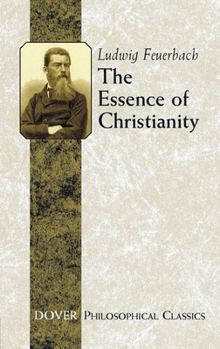The Essence of Christianity
(Part of the Great Books in Philosophy Series)
Select Format
Select Condition 
Book Overview
Did God create man? Or did man create God? Famed German philosopher Ludwig Feuerbach explores the answer in this, his most influential work, published in German in 1841 and translated by celebrated English novelist George Eliot. Using Biblical references, dialectics, and ideas from some of the world's greatest thinkers, he confronts believers with his cogent explanation. Approaching religion from a humanistic perspective, Feuerbach explores the idea...
Format:Paperback
Language:English
ISBN:0486454215
ISBN13:9780486454214
Release Date:June 2008
Publisher:Dover Publications
Length:304 Pages
Weight:0.60 lbs.
Dimensions:0.8" x 5.5" x 8.4"
Customer Reviews
4 ratings
ABSOLUTELY PHENOMENAL!!!
Published by Thriftbooks.com User , 19 years ago
"I DO NOT GENERATE THE OBJECT FROM THE THOUGHT, BUT THE THOUGHT FROM THE OBJECT" - Ludwig Andreas Feuerbach From all the books I read so far, this one has touched me the most. Feuerbach's way of theorising is totally compelling and his words are completly overpowering. This is the MOST BEAUTIFUL, MOST POWERFUL AND MOST HUMANE piece of literature I've ever come across!!!
I've seen the light!
Published by Thriftbooks.com User , 23 years ago
This book needs to be back on College Philosophy and Religion reading lists! Never before have I read such a clear and obvious explanation of the religious mind. Wonderful translation and editing work by George Eliot makes this a revolutionary work of religious philosophy. I'm a wife, mother, English Literature graduate and a spiritual seeker whose life was changed by reading Feuerbach's analysis of God as our subjective projection as Other. Please don't let your questing mind miss this one.
A document of human motivation
Published by Thriftbooks.com User , 24 years ago
I read this book in search of the philosophical roots of Max Stirner, author of The Ego and Its Own. For this purpose, the book is excellent; you can see where Max Stirner came from on a number of issues that had hitherto seemed a bit cloudy to me - both in what Stirner reacts to and what he has drawn on.The book is, however, a very compelling read in its own right as well. Feuerbach takes us through literally the whole catalogue of Christian belief, and shows us how each item of belief is explained at least as well - or perhaps even better - as an anthropomorphism rather than as a supernatural manifestation. It must be said, though, that each single one of his arguments on their own do not lead to such a conviction. Just like you are not convinced that the dice are loaded by getting 6 once or twice, you will not be convinced if anthropomorphism fits the bill of Christianity in a few single instances. However - analogously with the dice - when you strike 6 nearly every time, you will be convinced that the dice are loaded.If I have a criticism of Feuerbach, it is that after he has revealed the Essence of Christianity as being the worship of Man, he keeps the essence and only discards the accidental properties of Christianity, i.e. the supernaturalism. This was also what Max Stirner called him on. But my disagreement does not mean a disparagement of the value of the book. So I recommend it as a read.
Feuerbach: The Lutheran Athiest
Published by Thriftbooks.com User , 26 years ago
In one of the most convincing theological arguments for athiesm of all time, The Essence of Christianity was written in a period of heavy religous tension in Germany. Through Fererbach's lengthy assertions and occaisonally flowery prose, the belief in a God seperate from man is systematically destroyed, albeit with occasionally thin argument. Feuerbach contends that religion is an expression of humanity, and that the collective potential for reason, affection, and will is the true essence of religion. He therefore does not contend with many of the main tenants of Lutheranism as they apply to the anthropological essence of religion. He argues that the belief in God is merely a misdirected belief in humankind. This work is an important historical and social one as the idea of human supremicy sets the stage for Frederick Engles and the Marxist era of Russia. It is interesting reading and creates for myriad new ways of percieving specific aspects of religion and humanity-- a must for anyone interested in any sort of theology.





